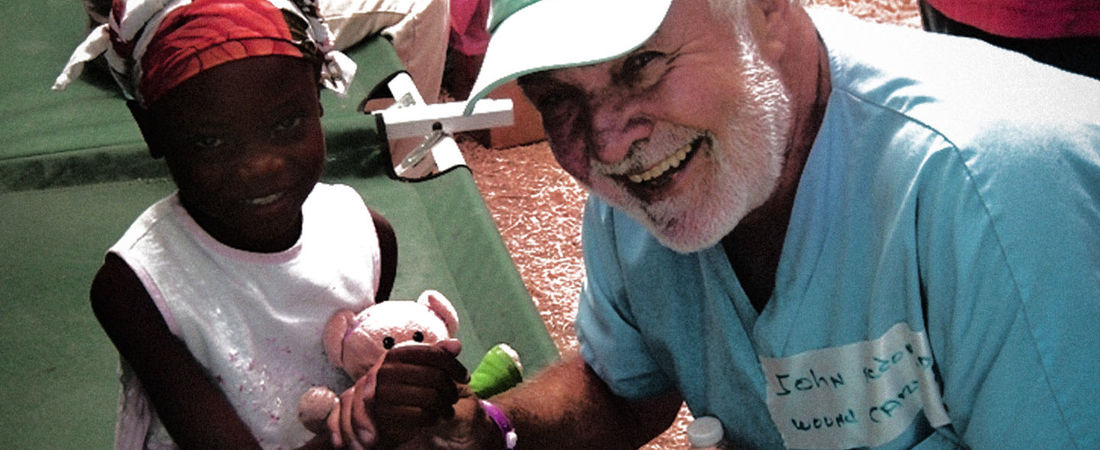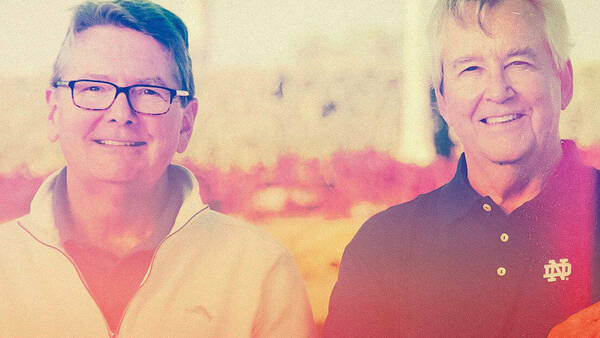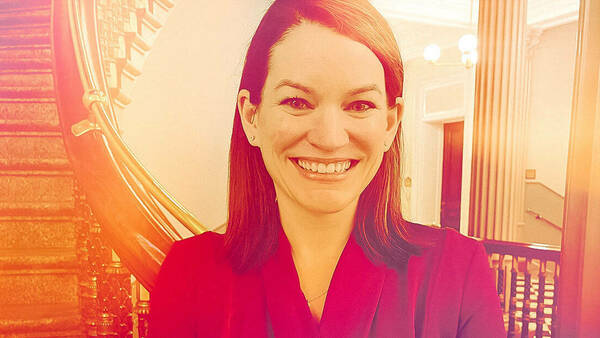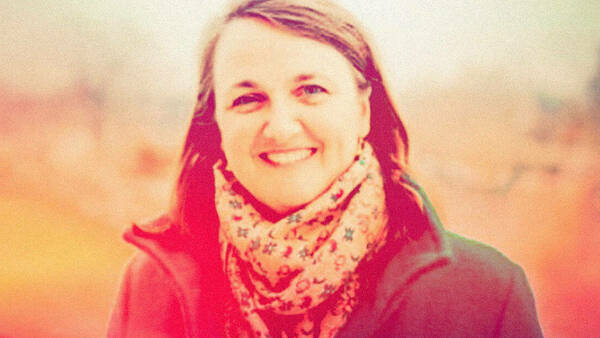When the catastrophic 7.0-magnitude earthquake hit Haiti on January 12, 2010, more than 220,000 people were killed and 300,000 injured. John Macdonald, M.D. ’58, a doctor who had been traveling to Haiti annually since the 1980s, was on the ground caring for patients in Port-au-Prince just two days later.
“We got to the airport and there was no electricity anywhere,” Macdonald says. “They took us in a pickup truck along the tarmac to these large warehouse tents where the United Nations was stationed. We walked into those two tents and there were about 200 patients on mattresses and cots on the floor, with crush injuries, diabetic acidosis, congestive heart failure. There was a small table with dressings, but no running water, no toilets, and no nurses. All we had with us were morphine tablets, and we began to say, ‘What are we going to do with all this?’”
Macdonald, a former thoracic surgeon now specializing in wound care, had arrived in Haiti with six other doctors. They immediately hopped out of the pickup truck and started triaging and caring for the patients. The acute need for Macdonald’s wound care expertise was apparent immediately.
“I realized all of a sudden—wait a minute, I was put here for a reason,” Macdonald says. “Eighty percent of these people had open wounds, and I said, ‘What we’ve got to do is create a structured wound care program.’”
Macdonald gathered all the available wound care gauze, sponges, and sutures into a central area and devised a systematic approach to treating the patients’ wounds. Four large, circus-size tents were then donated and built next to the Port-au-Prince airport tarmac. From January to July 2010, with the support of more than 300 volunteers, doctors treated 24,000 patients with open wounds.
Macdonald, who was traveling back and forth between Haiti and his home in Ft. Lauderdale during those seven months, had created the world’s first-ever designated wound care program after a natural disaster. Once his group made it through the immediate aftermath of the earthquake, he was determined to turn the wound care clinic over to the Haitian people, so they could continue caring for more typical, everyday wounds. The group had moved from the tents at the airport to a 20-bed clinic in Port-au-Prince, but with the support of a generous donor, they were able to create a wound care clinic and a 60-bed general hospital.
“We decided it was important for us to give this to the Haitians so they could sustain it without us,” says Macdonald, who still serves as the medical director of the clinic, located at the Hospital Bernard Mevs Project Medishare. “After the earthquake, we were dealing with diabetic patients with ulcers, spinal injury patients with pressure ulcers, people with venous ulcers. The quality of life in such countries does not depend on longevity; it depends upon freedom from pain and disability. These people don’t need open heart surgery or total hip replacement—they need good wound care.”
Macdonald has worked with the World Health Organization as a wound care expert in Haiti, Africa, and South America, and says that the majority of resource-poor countries don’t have adequate wound care. Throughout Haiti, 75 percent of diabetic patients with foot ulcers will require an amputation. At Macdonald’s clinic, only 15 percent of patients with that same ailment need amputations, thanks to proper wound care.
“This is the example we want to give to the rest of the world,” Macdonald says. “We have many places like Haiti that have no idea how to treat a basic wound, and that means that people are out of work, or they die from preventable infections. People don’t recognize that these wounds can be devastating.”
As medical director, Macdonald makes monthly trips to Haiti to check in at the wound care clinic, which is staffed by eight Haitians —a doctor, a nurse, and six others.
“One was an accountant, some were cooks, but we trained them in the basic principles of wound care and supervise them,” Macdonald says. “We’re taking care of 500 patient encounters a week—it doesn’t exist anywhere else in the Caribbean.”
The University of Miami Miller School of Medicine and its Department of Dermatology and Cutaneous Surgery, where Macdonald is currently on staff as a wound care expert, have also thrown their support behind the clinic. Going forward, it will be known as umCARE for Haiti, and there are plans to expand the program both within Haiti and internationally.
Macdonald counts his wife, Kari, the couple’s four sons, and his education at Notre Dame and the University of Pennsylvania School of Medicine among his life’s blessings, and says he feels a sense of obligation to help others because of all that he has been given.
“The entire legacy of the effort after the earthquake is whether or not we can use umCARE as a center of excellence to teach effective wound care,” he says. “I just took whatever gifts God gave me and am trying to use them as best I can. For to whom much has been given, much is expected in return.”



